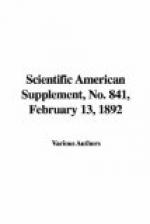I. Ordinary pressure: 10 grms. cellulose, with 580 c.c. of caustic soda solution, sp. gr. 1.09 21.99 10 grms. of soft wood, treated as above 49.19 10 " hard " " " 53.68
II. Pressure of five atmospheres: 10 grms. cellulose, with 500 c.c. caustic soda solution of sp. gr. 1.099 58.02 10 grms. of soft wood, treated as above 75.85 10 " hard " " " 69.80
III. Pressure of ten atmospheres: 10 grms. of cellulose 58.99 10 " soft wood 81.80 10 " hard " 70.39
IV. Ordinary pressure: 10 grms. of cellulose, with 500 c.c. caustic soda solution of sp. gr. 1.162 21.88 10 grms. of soft wood 35.45 10 " hard " 46.43
V. Pressure of five atmospheres: 10 grms. of cellulose, with 500 c.c. caustic soda solution of sp. gr. 1.162 77.33 10 grms. of soft wood 97.13 10 " hard " 91.48
VI. Ordinary pressure: 10 grms. of cellulose, with 500 c.c. caustic soda solution of sp. gr. 1.043 12.07 10 grms. of soft wood 28.37 10 " hard " 30.25
VII. Pressure of five atmospheres: 10 grms. of cellulose, with 500 c.c. of caustic soda solution of sp. gr. 1.043 15.36 10 grms. of soft wood 50.96 10 " hard " 55.66
VIII. Pressure of ten atmospheres: 10 grms. of cellulose, with 200 c.c. caustic soda solution of sp. gr. 1.043 20.28 10 grms. of soft wood 70.31 10 " hard " 65.59
From this it is evident that by increasing the temperature and pressure the solvent action of the alkali is increased, but the strength of the lye exercises an influence which is even more marked. Thus, at a pressure of five atmospheres, the loss of cellulose was 0.75 with a caustic lye containing 14 per cent. of NaHO, while it was only 0.05 with a lye of 8 per cent. NaHO.
To further elucidate the action of the alkali under the conditions given above, the author has estimated the amount of precipitate which alcohol gives with the soda solutions, after boiling with the wood:
1. 2. 3. Specific gravity of NaHO solutions 1.043 1.09 1.162 Soft wood, ordinary pressure 1.043 traces 4.8 " pressure of five atmospheres 1.043 2.0 26.8 " " ten " 1.043 1.7 — Hard wood, ordinary pressure 11.10 27.40 30.80 " pressure of five atmospheres 1.10 25.70 15.8 " " ten " traces 5.20 15.8
The estimation of the precipitate, produced in the soda solutions employed in the experiments cited above, gives:




